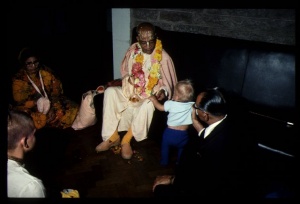SB 4.6.41: Difference between revisions
m (1 revision(s)) |
(Vanibot #0018 edit: make synonym terms in Sanskrit italic in SB - Vanisource) |
||
| Line 1: | Line 1: | ||
{{info | {{info | ||
|speaker=Maitreya | |speaker=Maitreya Ṛṣi | ||
|listener=Vidura | |listener=Vidura | ||
}} | }} | ||
[[Category:Srimad-Bhagavatam - Canto 04 Chapter 06]] | |||
[[Category:Bhagavatam Verses Spoken by Maitreya Rsi - Vanisource|040641]] | |||
<div style="float:left">'''[[Srimad-Bhagavatam]] - [[SB 4|Fourth Canto]] - [[SB 4.6: Brahma Satisfies Lord Siva|Chapter 6: Brahmā Satisfies Lord Śiva]]'''</div> | |||
<div style="float:right">[[File:Go-previous.png|link=SB 4.6.40]] '''[[SB 4.6.40]] - [[SB 4.6.42]]''' [[File:Go-next.png|link=SB 4.6.42]]</div> | |||
{{RandomImage}} | |||
==== TEXT 41 ==== | ==== TEXT 41 ==== | ||
<div | <div class="verse"> | ||
tathāpare siddha-gaṇā maharṣibhir | :tathāpare siddha-gaṇā maharṣibhir | ||
ye vai samantād anu nīlalohitam | :ye vai samantād anu nīlalohitam | ||
namaskṛtaḥ prāha śaśāṅka-śekharaṁ | :namaskṛtaḥ prāha śaśāṅka-śekharaṁ | ||
kṛta-praṇāmaṁ prahasann ivātmabhūḥ | :kṛta-praṇāmaṁ prahasann ivātmabhūḥ | ||
</div> | </div> | ||
| Line 16: | Line 22: | ||
==== SYNONYMS ==== | ==== SYNONYMS ==== | ||
<div | <div class="synonyms"> | ||
''tathā''—so; ''apare''—the others; ''siddha-gaṇāḥ''—the Siddhas; ''mahā-ṛṣibhiḥ''—along with the great sages; ''ye''—who; ''vai''—indeed; ''samantāt''—from all sides; ''anu''—after; ''nīlalohitam''—Lord Śiva; ''namaskṛtaḥ''—making obeisances; ''prāha''—said; ''śaśāṅka-śekharam''—to Lord Śiva; ''kṛta-praṇāmam''—having made obeisances; ''prahasan''—smiling; ''iva''—as; ''ātmabhūḥ''—Lord Brahmā. | |||
</div> | </div> | ||
| Line 23: | Line 29: | ||
==== TRANSLATION ==== | ==== TRANSLATION ==== | ||
<div | <div class="translation"> | ||
All the sages who were sitting with Lord Śiva, such as Nārada and others, also offered their respectful obeisances to Lord Brahmā. After being so worshiped, Lord Brahmā, smiling, began to speak to Lord Śiva. | All the sages who were sitting with Lord Śiva, such as Nārada and others, also offered their respectful obeisances to Lord Brahmā. After being so worshiped, Lord Brahmā, smiling, began to speak to Lord Śiva. | ||
</div> | </div> | ||
| Line 30: | Line 36: | ||
==== PURPORT ==== | ==== PURPORT ==== | ||
<div | <div class="purport"> | ||
Lord Brahmā was smiling because he knew that Lord Śiva is not only easily satisfied but easily irritated as well. He was afraid that Lord Śiva might be in an angry mood because he had lost his wife and had been insulted by Dakṣa. In order to conceal this fear, he smiled and addressed Lord Śiva as follows. | Lord Brahmā was smiling because he knew that Lord Śiva is not only easily satisfied but easily irritated as well. He was afraid that Lord Śiva might be in an angry mood because he had lost his wife and had been insulted by Dakṣa. In order to conceal this fear, he smiled and addressed Lord Śiva as follows. | ||
</div> | </div> | ||
__NOTOC__ | |||
<div style="float:right; clear:both;">[[File:Go-previous.png|link=SB 4.6.40]] '''[[SB 4.6.40]] - [[SB 4.6.42]]''' [[File:Go-next.png|link=SB 4.6.42]]</div> | |||
__NOTOC__ | |||
__NOEDITSECTION__ | |||
Revision as of 21:04, 30 November 2017

A.C. Bhaktivedanta Swami Prabhupada
TEXT 41
- tathāpare siddha-gaṇā maharṣibhir
- ye vai samantād anu nīlalohitam
- namaskṛtaḥ prāha śaśāṅka-śekharaṁ
- kṛta-praṇāmaṁ prahasann ivātmabhūḥ
SYNONYMS
tathā—so; apare—the others; siddha-gaṇāḥ—the Siddhas; mahā-ṛṣibhiḥ—along with the great sages; ye—who; vai—indeed; samantāt—from all sides; anu—after; nīlalohitam—Lord Śiva; namaskṛtaḥ—making obeisances; prāha—said; śaśāṅka-śekharam—to Lord Śiva; kṛta-praṇāmam—having made obeisances; prahasan—smiling; iva—as; ātmabhūḥ—Lord Brahmā.
TRANSLATION
All the sages who were sitting with Lord Śiva, such as Nārada and others, also offered their respectful obeisances to Lord Brahmā. After being so worshiped, Lord Brahmā, smiling, began to speak to Lord Śiva.
PURPORT
Lord Brahmā was smiling because he knew that Lord Śiva is not only easily satisfied but easily irritated as well. He was afraid that Lord Śiva might be in an angry mood because he had lost his wife and had been insulted by Dakṣa. In order to conceal this fear, he smiled and addressed Lord Śiva as follows.